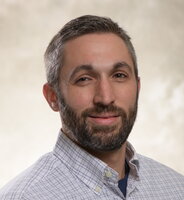
Professor Auerbach was one of ten new faculty hires made in the School of Molecular and Cellular Biology in the last three years. Auerbach is an assistant professor of molecular and integrative physiology, and is also an affiliate of the Beckman Institute.
Tell us about your lab and your research focus, including how you came to choose or specialize in this area.
We are a neuroscience research lab focused on what we call the three P’s: perception, plasticity and pathology. We are interested in answering the following questions:
(1) how does the brain encode and represent information about the world in its physical connections and patterns of electrical activity? (perception);
(2) how are these representations modified with changes to the environment and our experiences? (plasticity); and
(3) how does disruption to these processes contribute to psychiatric and neurological disorders? (pathology).
The rodent auditory system provides an excellent model for understanding how the brain represents and stores external information because it allows for the combination of precise stimulus control with tractable electrical and behavioral readouts in a well-defined neuroanatomical system. We use a multidimensional approach to address the above questions, combing quantitative sensory behavior with high density in vivo electrophysiology, ex vivo electrophysiological and biochemical analysis, as well optical and chemical manipulation of genetically-defined neuronal subtypes.
Beyond the advancement of basic insight into brain function and plasticity, we hope to leverage the knowledge gained from these studies to develop novel therapies and treatment strategies for a range of neurodevelopmental and hearing disorders. A major focus of our current work is on determining how auditory hypersensitivity, or hyperacusis, arises in rodent models of autism.
What is especially exciting about this particular area of research, at this time?
The most exciting thing about the field of neuroscience in general is that it is so wide open. The brain is an exquisitely complex organ and we have so much more to learn about its function. And we now have the tools to really start exploring brain function in very precise ways, including next generation DNA and RNA sequencing techniques, viral and CRISPR-mediated genetic manipulation, as well as optical techniques for imaging and manipulating neuronal activity in a cell-type specific manner with high spatial and temporal resolution. What’s most exciting about the field of brain plasticity specifically is its enormous therapeutic potential. If we can find a way to harness the brain’s vast potential to adapt and modify its function and connections, as well as understand the limits of this plasticity, this will have far reaching implications for a host neurological disorders—from autism to Alzheimer’s to addiction and more.
What interested you the most about becoming a faculty member in the School of Molecular and Cellular Biology and the University of Illinois?
Neuroscience is inherently interdisciplinary, being at the intersection of biology, chemistry, psychology and even computer science and engineering. What attracted me most to MCB was the wide-range of research being conducted within school and its strong connections to the many excellent cross-departmental programs at UIUC, such as the Neuroscience program, the Institute for Genomic Biology, and the Beckman Institute.
What are your teaching interests?
Synaptic function and plasticity; Sensory physiology
If any students (undergrad or grad) are interested in working in your lab, what’s your advice or how can they get in touch with you?
We are always looking for motivated students to help in our research. Anyone interested in learning more can email me.
Tell us about someone who made a difference in your life, such as someone who sparked your interest in biology, who encouraged you to pursue a career in academia or challenged your thinking about a topic.
I come from a family of scientists. My mom and dad were both academic researchers in biology-related fields and they revealed the strange and fantastic world of science to me and my brother from an early age. So really, I am just continuing the family business.
What do you like to do in your free time?
Hanging out with my family, hiking and exploring the C-U area, walking my dog Walter.
